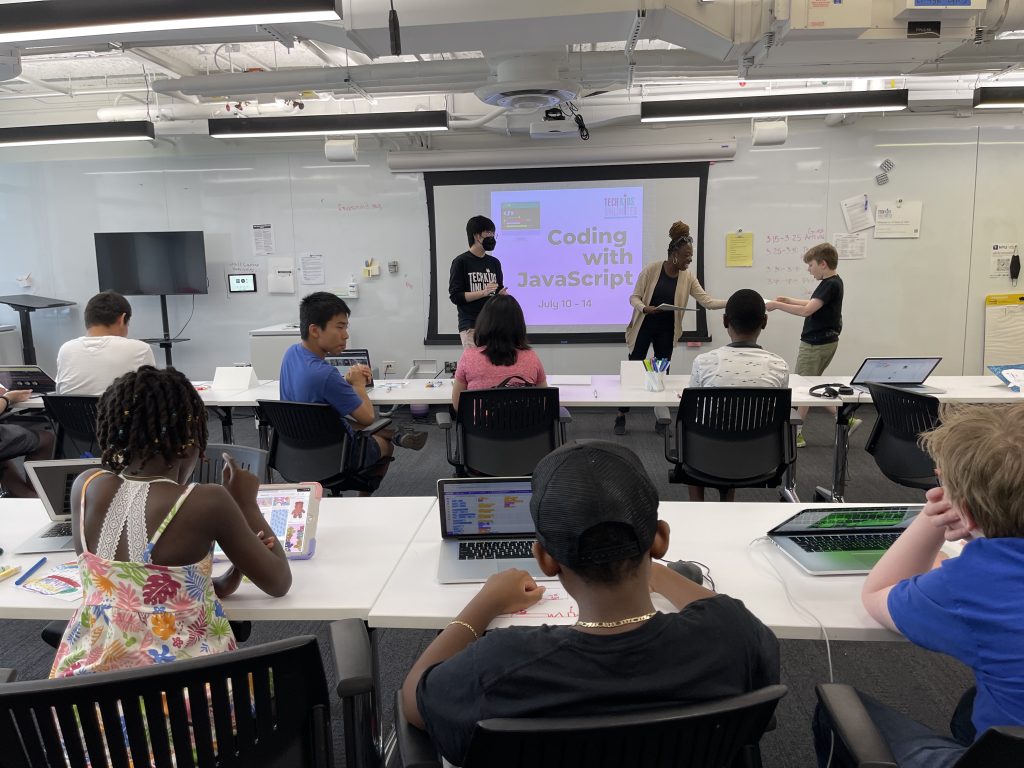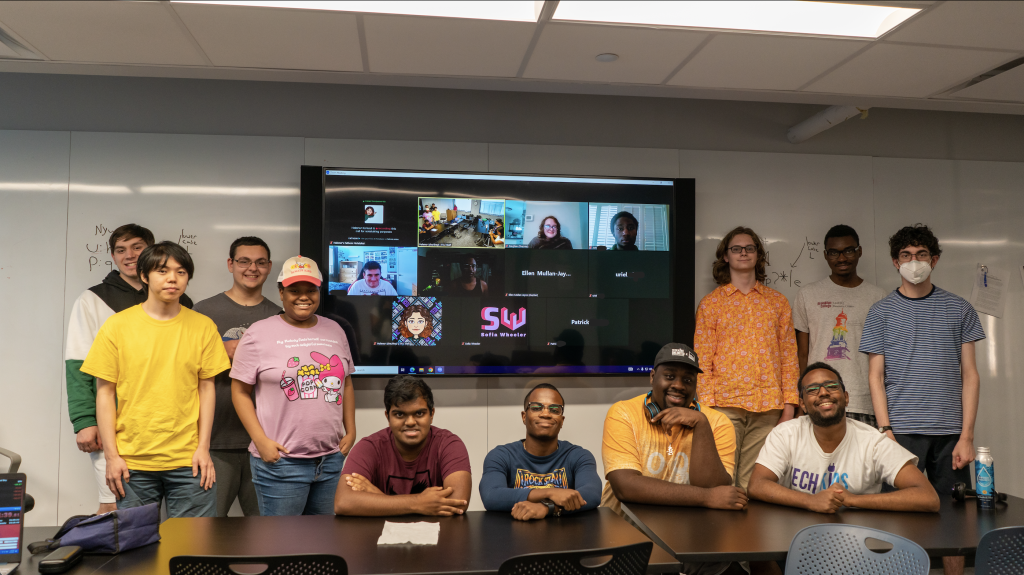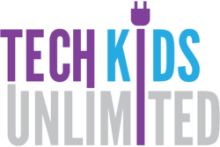Originally published by NYU Tandon School of Engineering

NYU Tandon Adjunct Professor Beth Rosenberg knows firsthand that students with special needs often feel adrift after school and on the weekend because of the dearth of programs tailored for them. More than ten years ago, her own neurodiverse son who loved technology was unable to find a supportive environment that would teach him to become a creator and producer of tech, rather than just a consumer of it.
Not content to let the situation continue, in 2009 Rosenberg piloted a small program that in 2014 became Tech Kids Unlimited (TKU), a now-thriving nonprofit education organization aimed at giving neurodiverse students the chance to create, develop, and share technology in a supportive environment — and to help them prepare for the demands of a 21st-century workplace. With her son’s help, she planned a series of classes and workshops on topics ranging from computer animation to video editing and website development, and as word spread, more and more parents flocked to her door.
The previous year, as she walked the halls of 2 MetroTech in between teaching classes, Integrated Design & Media (IDM) program director Luke DuBois had asked her about her work with students with disabilities. As a result of that conversation, Rosenberg hosted TKU’s first summer program, which subsequently became the direct service program for neurodiverse youth at NYU’s Ability Project, a joint initiative of NYU Tandon’s IDM Program, the Occupational Therapy Department at NYU Steinhardt, and the Interactive Telecommunications Program at NYU Tisch. Now headquartered at 370 Jay Street, TKU has helped thousands of students with autism, ADHD, and other challenges gain confidence and friends — along with a wide variety of tech and career ready job skills.
“All kids love technology but they have to be taught in a way that is suited to their learning style,” Rosenberg said. “Putting a student who may struggle to interact with others in front of tech software and watching them create something is fantastic and empowering at the same time.”
Rosenberg points out, however, that the teens are not the only ones to benefit from participating in TKU; for more than a decade, she has hired and trained NYU undergrad and grad students as counselors and teachers, and many consider it a highlight of their college and graduate career.
Lights, camera, action
When Sriya Sarkar, a filmmaker who had come to Tandon to hone her technical skills, volunteered to help staff a TKU hackathon, she was impressed — and not just because well-known political comedian Hasan Minhaj had agreed to address the participants. “The theme of the hackathon was how to identify fake news and online disinformation, and I was amazed at how savvy the students were about the topic,” she recalls.
That’s why when Rosenberg called to ask whether she would be able to take on an intern as part of a career ready summer program TKU runs, she agreed. Sarkar had worked for several years creating digital content at Change.org, a tech platform that has provided petition and campaign tools to more than half a billion grassroots activists across more than 196 countries, and she had recently joined a female-led independent production company, TELL2C, with the goal of making a documentary about Horace Peterson, a Michigan man who had been wrongfully incarcerated for more than 50 years.
TKU placed longtime student Miguel M., a talented teenage animator who wanted to one day launch his own studio. “This was not some kind of favor to Beth, although I consider her a good friend at this point,” Sarkar says. “Miguel was actually an enormous help to me because of his technical skills, and as an added bonus I found that explaining things to him step-by-step clarified my own thinking. Really, it’s changed the way I think about and deal with things in everyday life.”

A chance to research
Before coming to Brooklyn, Aaron Chu earned a B.A. in graphic, web, and interactive design from Millersville University of Pennsylvania and an M.A. in Design Research, Writing and Criticism, with a focus on disability, from the School of Visual Arts. He also possessed more than a decade of professional experience as a web developer. In the course of earning those degrees and experience, he had become dismayed by the lack of research into neurodiverse computer users.
“The literature review shows that this absence has spanned at least two decades,” he explains. “Despite a continuous call for more research, little empirical findings on neurodiverseWeb user experience have been published. This knowledge gap has ensnared website creators who want to build accessible Web interfaces, but have only anecdotal evidence to rely on.”
Entering Tandon’s IDM program and meeting Beth Rosenberg, Chu embarked on a master’s thesis project to gather needed empirical evidence and help to close that gap.
Among his findings were that neurodiverse users from ages 18 to 21 were adept at context switching; had a nuanced understanding of the Internet, computers and the current Web design paradigm; and were not — despite beliefs to the contrary — a homogenous group, with some being more comfortable navigating a site according to its functionalities and others more influenced by design aesthetics.
He says, “It was an unforgettable experience working with TKU, and I learned many things I’m now able to leverage in my work.”\
Becoming a better teacher
As a freshman, Sofia Wheeler had no specific ties to the neurodiverse community, but her interest was sparked when she heard that TKU was seeking NYU Tandon students to work as paid counselors for creative workshops. She wanted a job that would allow her to exercise the creative skills from her undergraduate IDM courses, and this seemed to fit the bill.
What followed over the next few years, however, was a deepened knowledge of neurodiversity, the challenges and rewards of working with a neurodiverse population, and a determination to advocate for more inclusive curricula at every level (along with, she quips, pay!).
Promoted from counselor to lead teacher her junior year, Wheeler embarked on a capstone project to build a tool that would allow teachers from TKU and other institutions to more easily find and access resources from their archive of lessons and best practices and serve as an AI assistant for inclusive curriculum planning.
In the process, she also gained a deeper understanding of herself, including the fact that she had untapped wellsprings of patience, empathy, and creativity. “Some students at TKU enjoy social interaction, while others don’t even want someone sitting near them, so you have to learn to put yourself in their shoes and adapt accordingly,” she says. “There’s always a way. I remember one stop-motion animation class in particular, when a student wanted only to play a video game instead of engaging with the lesson. The solution was to get him to try the assigned project using his game avatar; it was very satisfying to find that workaround.”
It takes funds
As a graduate student at NYU Tandon, Nirbhay Rajesh Shah was a dedicated TKU lead teacher who made an even bigger impact on the program well after he had moved on. In 2018 he accepted a job as a Design Strategist Advisor at the shipping giant FedEx, a company with a stated commitment to global community engagement and a long history of supporting worthwhile initiatives.
In Beth’s Rosenberg’s words: “After getting the job, Nirbhay marched himself right into the corporate social responsibility office and told them they should support TKU. And they did! They gave us $5k for a hackathon and then just last year — when the corporate social responsibility officer had moved on to another company, Nutrien, which is an agricultural concern, he remembered us and gave us $10K to create a hackathon focused on food insecurity — all because of this relationship that Nirbhay had set up!”
Shah, who has since become a UX Designer at Amazon, is modest about that chain of events. “I might have gone in and pitched TKU to the corporate social responsibility office, but it wasn’t my pitch that did it. The mission and accomplishments of the program are so undeniably important, it sells itself.”
A Q&A with IDM alum Yalta Zhu
Q: How did you get involved with TKU?
A: I first learned about TKU during my first year as a graduate student at NYU Tandon, when I was lucky to have Beth as my professor. I didn’t give much thought to its neurodiversity mission, initially. I saw it as an opportunity to engage with children and observe their activities, since my graduate research focused on online identities and avatars. I started out as a counselor.
Q: How did your role evolve?
A: I worked as a counselor for approximately two years and later took on the role of co-teacher. I’m extremely grateful for the support and kindness I received from Beth and my colleagues during my time at TKU!
Q: What are the greatest lessons you’ve learned from working with a neurodiverse population? How has the experience affected you personally and professionally?
A: Weeeellll . . . first of all, on a very personal note, I discovered that I checked all the boxes for someone with ADHD, which provided me with an explanation for many of my unusual behaviors and anxieties. Now I feel understood! and relieved! I wouldn’t have known this about myself if I hadn’t had the opportunity to work with TKU. Suddenly, I got access to all the resources needed to help myself perform better, so that’s undoubtedly one of the most significant personal lessons I’ve learned.
More specifically, I’ve come to appreciate how many TKU members embrace their uniqueness and the “weirdness” that comes with being neurodiverse. Being neurodiverse means finding individualized methods that work best for you, even if they deviate from the norm. For example, I have my noise-canceling headphones on all day, sometimes with ASMR videos in the background to help me focus. If not for my time at TKU, I might still care more about acting NORMAL (whatever that is) rather than doing what works best for me.
Secondly, as an international student, English is my second language, and I only began using it daily during my studies at NYU. Learning and using a new language as an adult can be challenging, and I often feel like a child, uncertain about what is acceptable to say. When we are young, whenever we hear an expression (aka the signifier), we start to internalize the meaning automatically, since we don’t have enough information to process whether the signified truly deserves to be learned.
I imagine our students feel the same way as I always do in TKU: surrounded by supportive staff members (and peers, for the students) who are always willing to help and offer their kindness and encouragement. I find myself internalizing the supportive language and gestures, as well as the mindset, and gradually becoming part of the group, and extending support to others in return.
I think, in TKU, this can be taken for granted in the best way possible. In this regard, I believe I’ve experienced the positive impact of our staff members more directly than anyone else, from my unique experience!
Q: What have been the greatest challenges and/or greatest rewards?
A: Coming from a design and tech background, one of my greatest challenges as a counselor was managing my anxiety when a TKU student didn’t show their best work. I know I needed to let go of this perfectionism, since these were just kids! With time, I began to see sparks of improvement and uniqueness in everyone’s work, and now I’m proud of all of them!
A program head’s perspective
Luke DuBois concludes: “Our partnership with Tech Kids Unlimited is one of the highlights of my career at NYU; nowhere else do we have such an incredible experiential learning opportunity for our students to engage with neurodiverse youth and feel like they are contributing to people’s lives and career goals. Beth is a powerhouse, and I am always amazed by her commitment and passion; it’s been a pleasure to see so many IDM students work with her and carry their experience forward in their own lives.”
